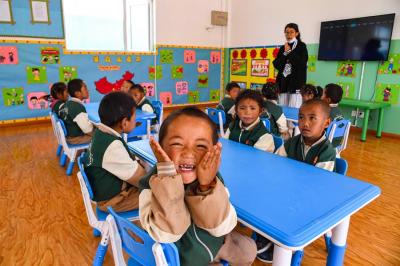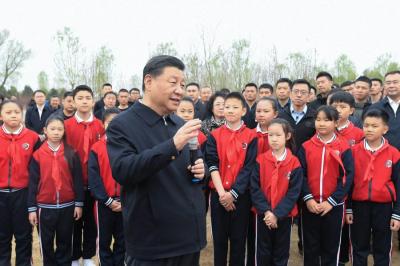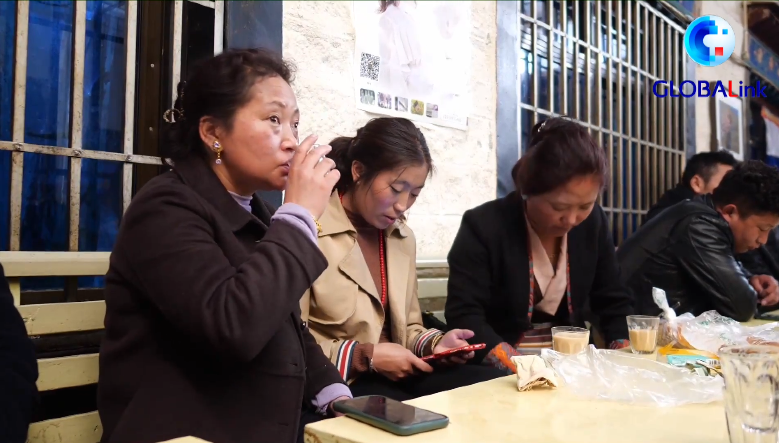| URUMQI, July 4, 2019 -- It is approaching 11 p.m. in the hinterland of the Pamir Plateau, northwest China's Xinjiang Uygur Autonomous Region, but the last touch of sunset glow still squeezes out the darkness that is about to shroud the area.
After closing a sheepfold, Ezibek Yusupbek, a 70-year-old herdsman, returns to his yurt. Standing on tiptoe outside the yurt, Yusupbek hangs a lamp to keep wolves from getting too close.
This is Yusupbek's daily routine in the summer on the Laybulaq Pasture where he grazes his flock of 50 sheep and 40 yaks.
Every summer, he and his livestock travel 60 kilometers from his village in Taxkorgan Tajik Autonomous County to the pasture.
Along with Yusupbek, there are only four other herding families grazing on the pasture.
The pasture may be quiet today, but was also once prosperous.
"Over 20 herding families used to bring their animals to graze here," Yusupbek says, with a bitter smile. "Now, I can't even find someone to chat with."
Many herdsmen in Xinjiang live in poverty due to the inaccessibility of their homes. Their income comes solely from herding and barely meets their basic living needs.
Thanks to anti-poverty and relocation policies by local government, many from Yusupbek's village have moved downtown.
Three of Yusupbek's sons are married and have already relocated.
His youngest, who also has an apartment there, has come back to the pasture after furnishing his new home.
"I feel worried about leaving my old man herding on the pasture alone," said Murgul Yusupbek.
However, just like other young herdsmen, Murgul finds it hard to bear the tedium of simple work on the pasture.
He can't help glancing at his phone even though there's no signal. When his father hums unheard tunes, he watches a TV series he had downloaded in advance to kill time.
Unlike his son, Ezibek Yusupbek has a strong emotional attachment to his flock and the pasture.
"Without the sheep and yaks, I feel like something is missing," he says.
Like his sons, he has a key to a new apartment in downtown Taxkorgan. But for now, Yusupbek is content with his yurt and his herd.
Fortunately for herdsmen who decide to stick with herding, the local government has implemented multiple policies to increase their incomes.
Individual herdsmen can put their livestock in a local cooperative which herds and breeds the animals collectively.
This frees herdsmen from the landlocked pasture so they have time for other more lucrative work. In the meantime, individual herdsmen get dividends from the cooperative.
To help young herdsmen find jobs, local government also provides vocational programs to train them to be cooks, electricians or construction workers.
The government also gives various subsidies to herdsmen who stay.
With these subsidies, herdsmen can downsize their flock. It helps to tackle overgrazing and generally better preserve the natural environment.
To take Ezibek Yusupbek as an example, he and his wife receive subsidies worth nearly 8,000 yuan (about 1164 U.S. dollars) each year. This is on top of their monthly pensions of 310 yuan.
Besides the cooperative and subsidies, herdsmen from Yusupbek's village were given 175 free tents by a local poverty alleviation project.
All of this makes life on the pasture easier, but Ezibek Yusupbek knows that one day he will have to leave, as his health deteriorates.
"I won't be here grazing two years from now," he says.
His youngest son Murgul will get married next year and hopefully find a job in the county.
It's unclear whether the other four households stay here. But what is clear is that, stay or go, the herdsmen of the Laybulaq Pasture are going to have better lives in the future.
|
- Home
- News Tibet |Exclusive |China |World |Related News |Latest
- Documents White Papers |Others
- Photo Politics |Economy & Society |Culture & Religion |Human & Nature |Beautiful Tibet |Other Tibetan-Inhabited Area |Exchanges |Related
- Video News |Documentary |Micro-Video |Entertainment
- Art
- Tourism
- In Focus
- About Tibet






